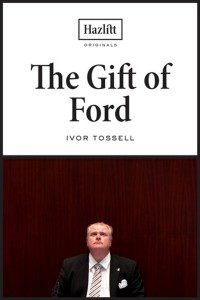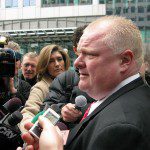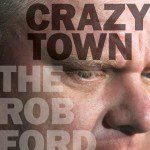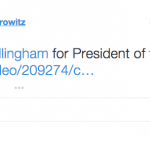Talking with Ivor Tossell
How did you decide to write The Gift of Ford?
That was an outgrowth of work I was doing for the Toronto Standard. I had been writing about urban affairs for my whole career. I was doing a lot of that for the Globe. I was also the Urban Decoder at Toronto Life. I had been writing about urban affairs for quite some time, but more through an urbanist perspective. It was only around the time of the 2008 election that I started writing about politics. I wrote a column about city politics for theTorontoStandard, and that led to Random House asking me to put together an e-book. They said, “Why don’t you finish what you started with this column about Rob Ford?”
Did you ever reach out to Rob Ford while you were writing the book?
I made a conscious decision that the book was not going to be a reporting piece. It was going to be a review of what happened.
Have you ever spoken to Ford?
I did earlier, when he was a councillor. The book draws on experiences I had going to events and observing. I have actually spent an awful lot of time in the same room, but the goal was to take a step back and give a survey of this for people who might not have been following the daily news.
The book is quite critical of Ford, but you do give credit where credit is due. Was it hard to be unbiased?
The thing that I always kept in mind was that people voted for Ford for good reasons. One of the big questions that I heard from talking to people was, “What the heck happened? How did this guy get elected?” I wanted to put that into context. I didn’t want to pass judgment on people for casting that vote in the first place.
You mention in the book that more people are coming to watch Toronto City Hall proceedings and following city politics in the news because of Ford. Would you consider that a good result?
Yes, engagement is a good thing. I think the jury is out on whether it is a net positive, but I think it has provided an opening for a whole new generation of civic activists, leaders, and reporters to come together in a way that might not have happened if city hall were operating in a more buttoned-down manner.
How do you think Ford has affected the way that the international media see Toronto?
Not good at all. If you want to talk about the way the city is branded, there is not a lot of room for nuance. People have limited attention spans for cities of the world, and they often only remember one or two things about a city. Toronto’s brand is becoming associated with an erratic mayor, and I think that is going to stick. Toronto is still being ribbed for the days when Mel Lastman was making colourful and off-kilter statements on television. This kind of thing sticks.
Note: This interview has been edited and condensed.















